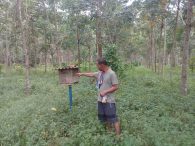
The Network of People’s Organizations for Bantad Mountain Range in southern province of Trang, Thailand formed a Honey Collective to diversify their sources of income when the rubber price starts to plummet. The 25 member farmers are changing from monoculture of cash crop to agroecological production. Their local bees are fed with nectar from coconuts, betel nuts, coffee trees and mangoes. In 2018, The first batch of honey harvest was introduced to the public in 2018. It was well-received and sold out quickly at good price. With support from AFOS/MTCP Project, the collective is planning to improve the packaging and product quality of their honey.
“I earned little from Para Rubber now. So, I grow other trees and fruit without using chemicals and keep bees. We use local bees. We have the rules to ensure that our bees are naturally kept. Our customers therefore trust our honey and the demand is higher than our productivity.”
Mr. Khuk Pheuakchai, leader of the Honey Collective

Comments are closed